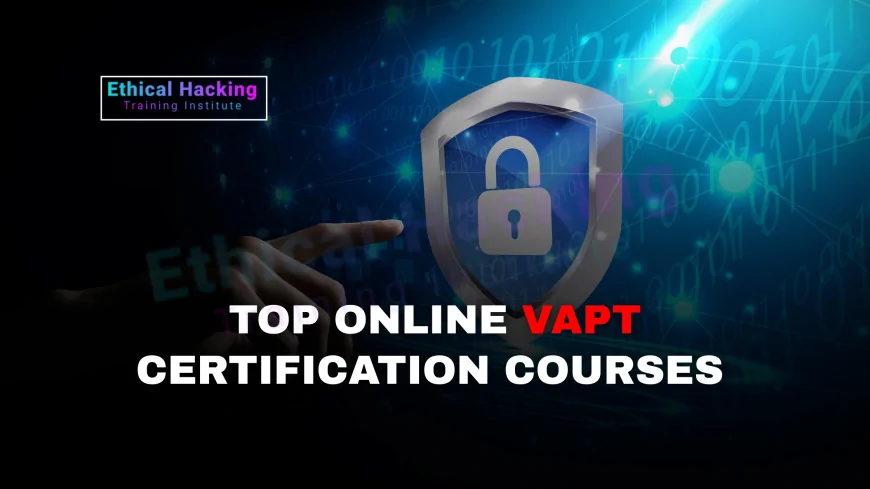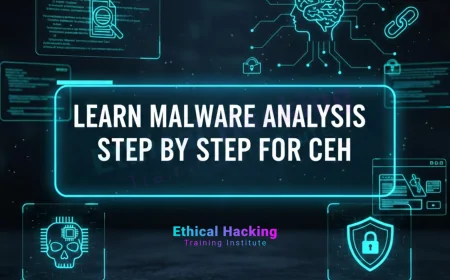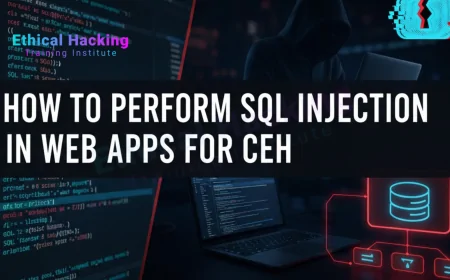Top VAPT Certification Courses Online to Boost Your Security Skills | Best Online VAPT Certification Programs to Enhance Cybersecurity Expertise
Explore the best VAPT certification courses online. Boost your cybersecurity skills with top-rated, hands-on Vulnerability Assessment and Penetration Testing training.

Table of Contents
- Introduction
- What is VAPT?
- Why VAPT Certification Matters
- Key Skills You Learn in VAPT Courses
- Top VAPT Certification Courses Online
- How to Choose the Right VAPT Course
- Career Opportunities After VAPT Certification
- Conclusion
- FAQs About VAPT Certification Courses
Introduction
With cyber threats becoming more sophisticated, organizations now prioritize Vulnerability Assessment and Penetration Testing (VAPT) to fortify their security infrastructure. Whether you’re an IT professional, a budding ethical hacker, or a cybersecurity enthusiast, a VAPT certification can skyrocket your career.
This guide outlines the top online VAPT certification courses that deliver both theoretical knowledge and hands-on experience to help you secure critical systems.
What is VAPT?
Vulnerability Assessment and Penetration Testing (VAPT) is crucial in any cybersecurity strategy. Here's what makes VAPT important and what key elements are involved:
Why VAPT is Important:
Identifies Security Weaknesses:
- VAPT uncovers vulnerabilities in systems, applications, and networks before attackers do.
- Helps fix misconfigurations, outdated software, and coding flaws.
Protects Sensitive Data:
- Prevents data breaches, ransomware, and unauthorized access.
- Essential for organizations handling personal or financial data.
Compliance & Regulations:
- Meets security standards such as ISO 27001, PCI-DSS, HIPAA, and GDPR.
- Mandatory for audits in many regulated industries.
Improves Incident Response:
- Prepares your team for real-world attack scenarios.
- Helps build better response and mitigation strategies.
Builds Trust & Reputation:
- Demonstrates your organization’s commitment to cybersecurity to both clients and partners.
- Minimizes the chance of reputational damage caused by data breaches.
What’s Included in a VAPT Process:
| Component | Description |
|---|---|
| Information Gathering | Collecting public and internal data about the target system. |
| Vulnerability Scanning | Using tools like Nessus, OpenVAS, or Qualys to detect flaws. |
| Manual Testing | Validating vulnerabilities that tools might miss or misinterpret. |
| Exploitation | Attempting to exploit vulnerabilities (without harming systems). |
| Post-Exploitation | Analyzing the impact and privilege escalation opportunities. |
| Reporting | Creating detailed, risk-ranked reports with fix recommendations. |
| Re-testing | Verifying that previously found vulnerabilities are resolved. |
Why VAPT Certification Matters
A VAPT certification demonstrates that you have the skills and expertise to identify vulnerabilities, exploit them, and recommend secure fixes. Here’s why certification is vital:
-
Career Growth: Opens doors in cybersecurity, IT auditing, and penetration testing.
-
Knowledge Enhancement: Understand real-time threat vectors and mitigation strategies.
-
Credibility: Enhances your professional credibility in a competitive job market.
-
Job Readiness: Aligns with industry standards like OWASP, NIST, and ISO 27001.
Key Skills You Learn in VAPT Courses
Enrolling in a VAPT course equips you with critical security skills:
-
Network Scanning and Enumeration
-
Web Application Security Testing
-
Exploitation Frameworks (Metasploit, Burp Suite)
-
Wireless Network Security
-
Linux & Windows Exploitation
-
Report Writing & Compliance Mapping
-
Real-Time Penetration Testing Labs
Top VAPT Certification Courses Online
Here’s a list of the best online VAPT certification programs to boost your cybersecurity journey:
1. Certified Ethical Hacker (CEH) – EC-Council
-
Platform: EC-Council/Authorized partners
-
Duration: 40 hours
-
Certification: Yes
-
Highlights: Covers penetration testing, hacking techniques, and tools.
2. Offensive Security Certified Professional (OSCP)
-
Platform: Offensive Security
-
Duration: Self-paced with lab access
-
Certification: Yes
-
Highlights: Highly practical, hands-on hacking labs.
3. Practical Ethical Hacking – TCM Security
-
Platform: Udemy / TCM Academy
-
Duration: 25+ hours
-
Certification: PEH Certificate
-
Highlights: Budget-friendly, in-depth real-world scenarios.
4. VAPT Specialist – WebAsha Technologies
-
Platform: WebAsha
-
Duration: 6 weeks
-
Certification: Yes
-
Highlights: Focused on live project training and report generation.
5. Ethical Hacking and Penetration Testing Course offered by Cybrary
-
Platform: Cybrary
-
Duration: 15–20 hours
-
Certification: Yes
-
Highlights: Beginner to intermediate level with quizzes and assessments.
6. Comprehensive Network Security Training in Cybersecurity
-
Platform: Udemy
-
Duration: 12+ hours
-
Certification: Yes
-
Highlights: Covers Wi-Fi hacking, firewalls, VPNs, and more.
7. Advanced Web Hacking – PortSwigger / Hack The Box
-
Platform: PortSwigger Academy, HTB
-
Duration: Self-paced
-
Certification: Yes
-
Highlights: Best for mastering web-based penetration testing.
8. IBM Cybersecurity Analyst – Coursera
-
Platform: Coursera
-
Duration: 6 months (flexible)
-
Certification: IBM Certificate
-
Highlights: Includes fundamentals of VA/PT and SOC operations.
How to Choose the Right VAPT Course
Before enrolling, consider the following:
-
Your Skill Level – Beginner, Intermediate, or Advanced
-
Career Goals – Ethical hacking, pentesting, or auditing
-
Practical Labs – Hands-on labs offer real-world experience
-
Course Duration & Format – Full-time vs. part-time, self-paced or live
-
Certification Value – Recognized by employers or vendors?
Career Opportunities After VAPT Certification
Once certified, you can explore exciting cybersecurity roles such as:
-
Penetration Tester
-
Cybersecurity Analyst
-
Security Consultant
-
SOC Analyst
-
Ethical Hacker
-
Compliance Officer (ISO/NIST)
VAPT skills are applicable in multiple industries including banking, IT services, telecom, government, and healthcare.
Conclusion
In today’s hyper-connected world, VAPT certifications are a necessity for any security professional. The right course can help you gain practical skills, advance your career, and contribute meaningfully to your organization’s cybersecurity posture. Choose a program aligned with your goals, and ensure it offers real-world labs, up-to-date tools, and credible certification.
FAQs
1. What is VAPT in cybersecurity?
VAPT stands for Vulnerability Assessment and Penetration Testing, used to identify and exploit security vulnerabilities in systems.
2. Are VAPT courses suitable for beginners?
Yes, many courses offer beginner modules, though some advanced ones like OSCP require prior experience.
3. What is the duration of VAPT certification courses?
Courses can range from 1 week to 6 months depending on the depth and format.
4. Which certification is best for VAPT?
CEH, OSCP, and PEH are highly recognized in the industry.
5. Is VAPT certification worth it?
Absolutely. It adds significant value to your resume and opens up cybersecurity roles.
6. Can I learn VAPT online?
Yes, many reputable platforms offer online, self-paced, or live instructor-led VAPT courses.
7. What tools will I learn in a VAPT course?
You’ll learn tools like Burp Suite, Metasploit, Wireshark, Nmap, Nessus, etc.
8. Do I need programming knowledge for VAPT?
Basic knowledge of Python, Bash, or PowerShell is beneficial but not mandatory.
9. What’s the difference between VA and PT?
VA identifies vulnerabilities, while PT exploits them to assess real-world impact.
10. Is CEH a good starting point for VAPT?
Yes, CEH covers both VA and PT techniques with global recognition.
11. What industries hire VAPT professionals?
Finance, IT services, telecom, healthcare, and government sectors.
12. Can I get a job after a VAPT course?
Yes, many students land roles like penetration testers or security analysts post-certification.
13. Are there any free VAPT courses?
Yes, platforms like TryHackMe and PortSwigger offer free labs and courses.
14. What is the average salary after VAPT certification?
In India, average salaries range from ₹5 LPA to ₹15 LPA depending on experience.
15. Is there a VAPT certification from Google?
No, Google does not offer VAPT-specific certification, but it supports security training.
16. Do I get a certificate on Udemy or Coursera?
Yes, most courses offer certificates upon completion.
17. Can I do VAPT as a freelancer?
Yes, many VAPT professionals work independently for startups and businesses.
18. Are VAPT skills useful for bug bounty?
Yes, VAPT techniques are fundamental for bug bounty hunting.
19. Is OSCP better than CEH?
OSCP is more practical and advanced, while CEH is theory-focused and entry-level.
20. What prerequisites do I need for a VAPT course?
Basic IT/networking knowledge and curiosity about cybersecurity are sufficient to begin.
What's Your Reaction?
 Like
0
Like
0
 Dislike
0
Dislike
0
 Love
0
Love
0
 Funny
0
Funny
0
 Angry
0
Angry
0
 Sad
0
Sad
0
 Wow
0
Wow
0

















